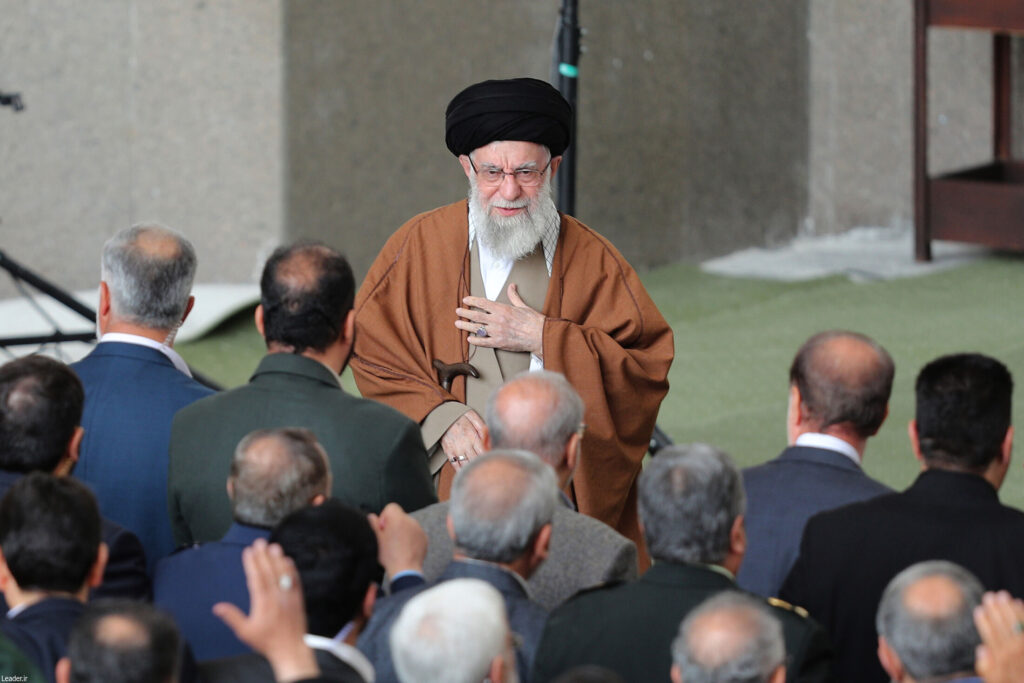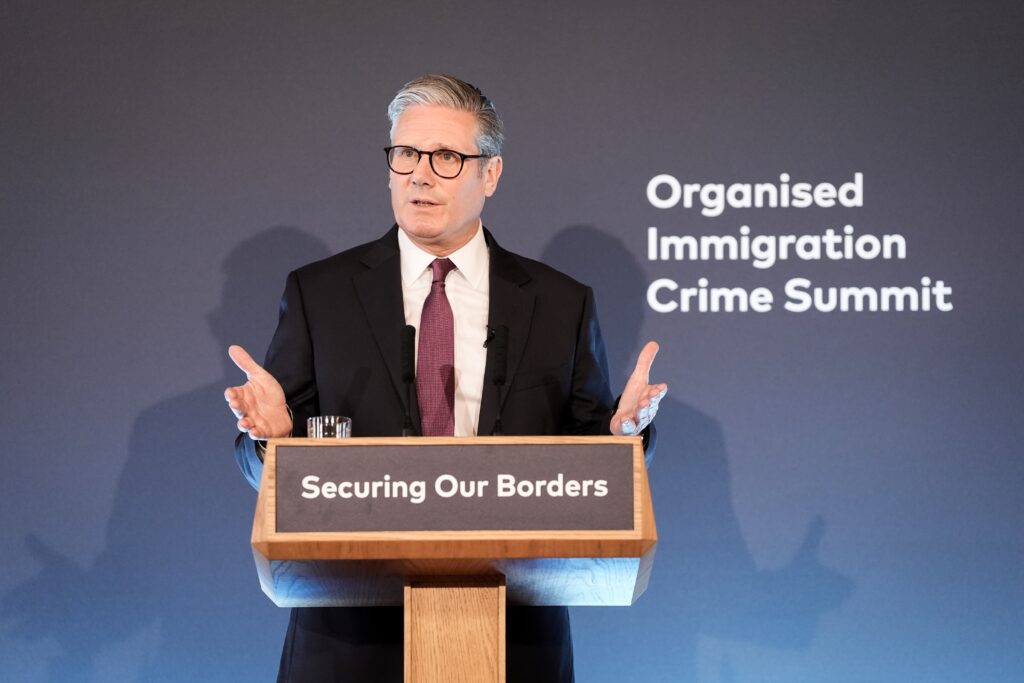AFP Asia Business
Khamenei warns of ‘strong’ response if Iran attacked
Iran’s supreme leader Ayatollah Ali Khamenei warned Monday of a forceful retaliation if the United States or its allies bomb the Islamic republic, following a threat by President Donald Trump.”They threaten to do mischief,” Khamenei said of Trump’s latest threat, during a speech on Eid al-Fitr, the holiday marking the end of the Muslim fasting month of Ramadan.”If it is carried out, they will definitely receive a strong counterattack.”In an interview on Saturday, Trump said “there will be bombing” if Iran does not agree to a deal to curb its nuclear programme.”If they don’t make a deal, there will be bombing,” he said, according to NBC News, which said he also threatened to punish Iran with what he called “secondary tariffs”.Trump’s language represented a sharpening of his earlier comment that if Tehran refused to negotiate a new nuclear agreement, “bad, bad things are going to happen to Iran.”It was not clear whether Trump was threatening bombing by US planes alone or perhaps in an operation coordinated with another country, possibly Iran’s nemesis Israel.Iranian foreign ministry spokesman Esmaeil Baqaei, in a post on X, said that “an open threat of bombing by a head of state against Iran is a shocking affront to the very essence of international peace and security.”Baqaei warned of unspecified “consequences” should the United State choose a path of “violence”.- ‘Glass room’ -A statement on Monday also said the foreign ministry summoned the charge d’affaires of the Swiss embassy, which represents US interests in Iran, “following the threats by the US president”.”The Americans have at least 10 bases in the region around Iran, and they have 50,000 troops,” warned General Amirali Hajizadeh, commander of the aerospace force of Iran’s Islamic Revolutionary Guard Corps.”Someone who is in a glass room shouldn’t throw stones at anyone,” the man in charge of Iran’s ballistic missile programme threatened on state television Monday.Since taking office in January, Trump has reinstated his “maximum pressure” policy, which in his first term saw the United States withdraw from a landmark agreement on Iran’s nuclear programme and reimpose sanctions on Tehran.Western countries including the United States have long accused Iran of pursuing a nuclear weapon, which Tehran has denied, insisting its enrichment activities were solely for peaceful purposes.The 2015 nuclear deal between Tehran and world powers required Iran to limit its nuclear ambitions in exchange for sanctions relief.- ‘Indirect’ channel -On March 7, Trump said he had written to Khamenei to call for nuclear negotiations and warn of possible military action if Tehran refused.The letter was delivered to Tehran on March 12 by UAE presidential adviser Anwar Gargash, Iranian news agency Fars reported at the time.On Thursday, Iranian Foreign Minister Abbas Araghchi said the country had delivered a response via intermediary Oman, without detailing its content.Araghchi said Iran would not engage in direct talks “under maximum pressure and the threat of military action”.In his remarks, however, the minister left open the door for “indirect negotiations”.According to NBC, Trump also said US and Iranian officials were “talking,” but he did not give details.President Masoud Pezeshkian on Sunday said Khamenei, who as supreme leader has the final say in major state policies, had permitted indirect talks.Oman has served as an intermediary in the past, in the absence of US-Iranian diplomatic relations severed after the 1979 Islamic revolution.On Monday, Araghchi said the United States had received Iran’s letter.”We have been informed by our friends in Oman that the letter has reached its destination and has been read.”Beyond its nuclear programme, the West also accuses Iran of using proxy forces to expand its influence in the region, a charge Tehran rejects.”There is only one proxy force in this region, and that is the corrupt usurper Zionist regime,” Khamenei said, calling for Israel to be “eradicated”.
Renault and Nissan shift gears on alliance
Renault and Nissan said Monday they had revised their partnership to allow for a reduction in their cross-shareholdings and other measures that would help the financially troubled Japanese carmaker.The new agreement will allow the carmakers to reduce their current 15 percent cross-shareholdings to 10 percent.Renault will also acquire Nissan’s 51 percent stake in their joint …
UK PM urges nations to smash migrant smuggling gangs ‘once and for all’
UK Prime Minister Keir Starmer urged dozens of countries to collaborate to dismantle migrant smuggling gangs “once and for all” when he opened an immigration crime summit on Monday.Starmer is seeking to crack down on would-be asylum seekers arriving in England on flimsy small boats and has brought together delegates from more than 40 nations for the two-day London meeting.The interior ministers of France and Germany were among those attending the Organised Immigration Crime Summit. China and the United States also sent representatives.The UK government is struggling to stop undocumented migrants embarking on dangerous boat journeys across the Channel from France. “This vile trade exploits the cracks between our institutions… and profits from our inability at the political level to come together,” Starmer said. He argued that resources and intelligence must be shared and that governments need to “tackle the problem upstream at every step of the people-smuggling routes”.”There’s nothing progressive or compassionate about turning a blind eye to this,” Starmer added.Britain’s Home Office (interior ministry) billed the gathering as “the first major international summit in the UK to tackle the global emergency of illegal migration”.Representatives from across Europe, Asia, the Middle East, Africa, as well as North America were due to attend.In a video message played to delegates, Italy’s far-right prime minister Giorgia Meloni hailed her country’s agreement with Albania to process asylum claims at detention centres in the non-European Union country.She claimed that countries “criticised (it) at first but that then has gained increasing consensus”.Italian judges have repeatedly refused to sign off on the detention in Albania of migrants intercepted by Italian authorities at sea, ordering them to be transferred to Italy instead, and the European Court of Justice is reviewing Rome’s policy.- Online recruitment -The summit is designed to build on talks interior minister Yvette Cooper held in December with her counterparts from Belgium, Germany, France and the Netherlands.The five countries signed a joint action plan designed to boost cooperation to dismantle migrant smuggling gangs.Also attending were delegates from countries from where would-be asylum seekers set out, such as Vietnam and Iraq, and countries they transit, such as those in the Balkans.It also brings together the heads of UK law enforcement agencies and their counterparts from Interpol, Europol and Afripol.The Home Office said the summit would discuss the equipment, infrastructure and fraudulent documents that organised criminal gangs use to smuggle people.They would also look at how supply routes work and discuss how to tackle the online recruitment of migrants, including with representatives from social media platforms Meta, X and TikTok.The UK announced on Sunday it was launching adverts on Zalo, the Vietnamese instant messaging system, to warn people of the dangers of people smugglers.Vietnamese nationals are among the top nationalities making the perilous sea voyage across the Channel to Britain.Similar UK campaigns have already been launched in Albania and Iraqi Kurdistan.UK officials are also keen to speak to China about how it can stop exporting engines and other small boats parts used in crossings.According to the Home Office, the UK’s National Crime Agency and global law enforcement partners have seized 600 boats and engines since July.- Domestic pressure -Starmer told the meeting that since his Labour government took power in July, more than 24,000 people with “no right to be here” had been returned.But the number of would-be asylum seekers arriving across the Channel set a new record last week for the first three months of the year — at more than 6,600.At least 10 people are dead or missing after attempting the treacherous crossing so far this year, according to the International Organisation for Migration.More than 157,770 people have been detected trying to enter Britain in dinghies since successive governments began collecting data in 2018.In February, Starmer’s government announced it was toughening immigration rules to make it almost impossible for undocumented migrants who arrive on small boats to later receive citizenship.On Sunday, it said it would tighten rules to legally require UK gig economy employers to carry out right-to-work checks.Starmer is under pressure, in part from rising support for Nigel Farage’s anti-immigration Reform UK party, which won roughly four million votes at July’s general election — an unprecedented haul for a hard-right party.Rights group Amnesty International stresses: “Seeking asylum is a human right. This means everyone should be allowed to enter another country to seek asylum.””The people are not the problem,” it says on its website. “Rather, the causes that drive families and individuals to cross borders and the short-sighted and unrealistic ways that politicians respond to them are the problem.”



